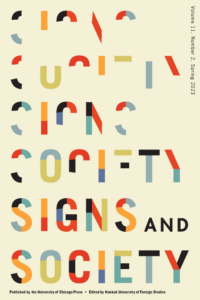
Yuichi Asai
Signs and Society, Volume 11, Number 2, Spring 2023
Abstract: This article analyses an environmentalist activity known as forest therapy in a suburb of Tokyo and formulates qualia as a rhematic textual process semiotically calibrating an encounter with forests in such a way that its effects seem raw, natural, or “unmediated.” In particular, it ethnographically demonstrates how a distinctive cooccurrence style of Japanese language use, involving ideophones and euphonic forms with various diminutive effects during forest therapy interactions, becomes a perceivable object of the senses qua discursive form, whose effects—which are not natural but naturalizing—further equips participants in forest therapy sessions to apperceive and discursively specify the attributes of other perceivable things, now taken to be “immediate” sensuous truths, through a process whose effects Peirce captions as qualia, or facts of firstness. The article further reveals that such a naturalized—and thus therapeutic—encounter with forests is figurated through various rhematic, text-metrical patterns that rely on specific discursive resources, which cumulatively diagram agents’ affective attunements to a nonhuman forest world, while enacting transspecies engagement with animals and “fictionalizing” the (lost) animistic linkage in the Anthropocene with “wildness” through their bodies as phatic nexus.
About the author: Yuichi Asai was a HYI Linguistic and Semiotic Anthropology Training Program Visiting Scholar, 2021-22.
